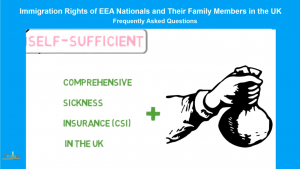Today’s post is about EU Citizens in the UK: SELF-SUFFICIENT PERSONS

If you are not working or self-employed, if you are not as student and have not retained your right of residence in the UK, can you still stay in the UK? If you watched my answered to the previous questions, you probably already know that only those EEA nationals, who can be considered as qualified persons may remain in the UK beyond the 3-months point. This same applies to their Family members as the EEA nationals family members’ right to remain in the UK after three months will always depend on whether or not the EEA nationals have established themselves in the UK as qualified persons.
Jobseekers
These include jobseekers (if they were not looking for work for longer than 91 days), workers, self-employed persons and student. However what if are an EEA national, but do not fall under any of the above categories? Can you still stay in the UK? The answer is ‘YES’, provided to you can prove to the Home Office two points:
- That you have enough money to cover your own and any family member’s living expenses without claiming benefits in the UK
- That you have comprehensive sickness insurance (CSI) in the UK
It is all pretty straightforward with comprehensive sickness insurance: you either have it or you don’t. But in case you want to find out more about it, please feel free to subscribe to my channel and you’ll be altered when my video about comprehensive sickness insurance is out.
However, in today’s video I would like to concentrate on a grey area of proving that you have enough money to cover your and your family’s essential outgoings, which will help you prove your self-sufficient status. I’ll show now how the Home Office assesses this:
The key rule here is that you have more than the maximum level of resources which a British citizen. Also that their family members are allowed to have before they no longer qualify for social assistance.
Now, let me show you have the Home Office calculates this:
-
the first thing they do is they check the EEA national’s source/s of income.
To help them do that, you should provide the decision maker with one or more of the following:
- bank statements showing your savings
- evidence of pension payments (if any)
- receipt of educational grants from overseas
- the income of a partner, a spouse or other family members to which you have regular access, for example, funding by parents or spouse. Please bear in that if your or a spouse are in the UK, you will also need to provide evidence confirming that they can work in the UK. This is, of course, is not a full list of the documents, which can be provided. So, basically, you should provide documents proving all sources of income.
And the next stage is:
-
assessing your and your family’s essential outgoings;
This done by assessing your financial commitments, such as:
Rent, mortgage, utility bills, loan, credit cards and other personal debt payments and additional costs, such as travel, food costs, etc.
And the last step is:
-
deducting the essential outgoings amount from your income.
And if you have a surplus, this means that you’ve passed the test. In these circumstances, the UKVI will recognise you as a self-sufficient person for all purposes of EU law.
Please remember that it is your ongoing obligation to keep ensuring that you meet the self-sufficiency test throughout the entire period of your residence in the UK.
